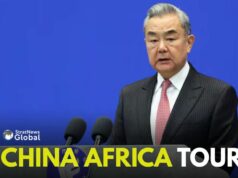The United States is struggling to contain the social and educational fallout of short-form video platforms like TikTok—a failure that could erode the foundations of its future power, according to a new analysis from The China-Russia Report.
Titled “Short-form video addiction is undermining U.S. society and power: Comparing approaches in China, Russia, and Australia,” the article argues that Washington has failed to address the cognitive and psychological consequences of algorithm-driven apps dominating young people’s lives.
The study was co-authored by Samantha Wong, assistant director at the Atlantic Council’s Global China Hub, and Joe Webster, a senior fellow at the Atlantic Council who runs The China-Russia Report, an independent, nonpartisan publication examining economic, political, and security dynamics between China and Russia.
Wong and Webster write that “failing to get technology education right will hold decades-long consequences for millions of American children and their families—and the future of American power.” They urge U.S. policymakers to study how other countries are regulating short-form video platforms, especially their use by children.
Beijing, they note, has introduced sweeping restrictions at home while allowing these same platforms to operate almost freely abroad. Douyin, the Chinese version of TikTok, must enforce a “youth mode” limiting users under 14 to 40 minutes a day and blocking access between 10 p.m. and 6 a.m. Authorities have also targeted content deemed inconsistent with official values, suspending luxury influencers and banning material seen as encouraging materialism.
China’s curbs extend to gaming, with minors restricted to three one-hour sessions per week. Though some children evade the limits using parents’ accounts, official data show progress: the share of youth gaming excessively dropped from 37 per cent in 2021 to 25 per cent in 2024. These measures, the report notes, aim to improve study habits, mental health, and social discipline — objectives made easier by China’s centralised control over companies like Tencent.
Russia’s approach, by contrast, focuses on censorship and information control rather than child protection. Since 2022, the Kremlin has banned or throttled platforms including Facebook, Instagram, and TikTok under sweeping “fake news” and “discrediting the army” laws. It has simultaneously promoted VKontakte (VK) — a Gazprom-owned domestic platform — as a substitute, while adding minimal safeguards for minors. A 2024 breach that exposed 390 million VK profiles, many belonging to children, highlighted deep security flaws.
The report argues that Russia’s strategy “prioritises surveillance and propaganda over youth welfare”, revealing its limited capacity to craft balanced technology policy.
Australia, meanwhile, has taken the boldest democratic step. Starting December 10, 2025, it will bar children under 16 from using social media entirely. The decision follows research, notably by psychologist Jonathan Haidt, linking surging adolescent depression and anxiety to smartphones and social media. Wong and Webster call the policy “a necessary intervention to protect mental health, especially for young girls.”
The authors point to new threats from AI-generated influencers such as “Mia Zelu”, a virtual persona that went viral despite being completely artificial. They warn that exposure to such flawless avatars could intensify insecurity and social comparison among children already vulnerable to dopamine-driven “like” and “comment” loops.
The report concludes that the U.S. risks both social decay and strategic decline if it continues allowing unrestricted short-form video use. It warns that the platforms degrading youth attention and literacy could also serve as tools of foreign influence. Under China’s 2017 National Intelligence Law, companies like ByteDance are legally required to “support, assist, and cooperate with national intelligence efforts”, raising serious security concerns about TikTok’s global operations.
“The short-form video status quo is unacceptable,” Wong and Webster write. “Limiting short-video platforms and delaying social media for children will help ensure a happier society and a stronger country.”
In a career spanning three decades and counting, Ramananda (Ram to his friends) has been the foreign editor of The Telegraph, Outlook Magazine and the New Indian Express. He helped set up rediff.com’s editorial operations in San Jose and New York, helmed sify.com, and was the founder editor of India.com.
His work has featured in national and international publications like the Al Jazeera Centre for Studies, Global Times and Ashahi Shimbun. But his one constant over all these years, he says, has been the attempt to understand rising India’s place in the world.
He can rustle up a mean salad, his oil-less pepper chicken is to die for, and all it takes is some beer and rhythm and blues to rock his soul.
Talk to him about foreign and strategic affairs, media, South Asia, China, and of course India.





